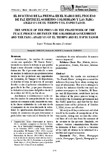Mostrar el registro sencillo del ítem
El discurso de la prensa en el marco del proceso de paz entre el gobierno colombiano y las FARC: análisis de El Tiempo y El Espectador
| dc.rights.license | http://creativecommons.org/licenses/by-nc-sa/3.0/ve/ | es_VE |
| dc.contributor.author | Romero Jiménez, Karol Viviana | |
| dc.date.accessioned | 2018-06-20T21:45:35Z | |
| dc.date.available | 2018-06-20T21:45:35Z | |
| dc.date.issued | 2017 | |
| dc.identifier.issn | 1690-3544 | |
| dc.identifier.uri | http://www.saber.ula.ve/handle/123456789/45023 | |
| dc.description.abstract | Actualmente, los medios de comunicación son apodados ‘El Cuarto Poder’, teniendo en cuenta la influencia que pueden llegar a tener al emitir cualquier tipo de información. En el presente artículo se trata de analizar la influencia que pudieron haber tenido los dos periódicos más importantes de Colombia, El Tiempo y El Espectador, al abordar el tema del proceso de paz que llevaba a cabo el gobierno colombiano y la guerrilla de las Farc, y que para el momento definitivo (votaciones del plebiscito del 2 de octubre del 2016), no fue eficaz. Analizamos si existen o no y cuáles serían los modos de manipulación de los dos medios de comunicación, teniendo en cuenta las líneas editoriales de cada uno desde el momento de su creación hasta la actualidad. De igual manera abordamos diversas teorías de comunicación para determinar si pudo haber una violación al derecho de los ciudadanos de estar informados de manera veraz e imparcial. | es_VE |
| dc.language.iso | es | es_VE |
| dc.publisher | SABER-ULA | es_VE |
| dc.rights | info:eu-repo/semantics/openAccess | es_VE |
| dc.subject | Farc | es_VE |
| dc.subject | Noticia | es_VE |
| dc.subject | Artículo periodístico | es_VE |
| dc.subject | Diario | es_VE |
| dc.subject | Discurso | es_VE |
| dc.subject | Informe periodístico | es_VE |
| dc.title | El discurso de la prensa en el marco del proceso de paz entre el gobierno colombiano y las FARC: análisis de El Tiempo y El Espectador | es_VE |
| dc.title.alternative | The speech of the press in the framework of the peace process between the colombian government and the FARC: analysis of El Tiempo and El Espectador | es_VE |
| dc.type | info:eu-repo/semantics/article | es_VE |
| dcterms.dateAccepted | 02/08/2017 | |
| dcterms.dateSubmitted | 28/06/2017 | |
| dc.description.abstract1 | Currently, the media are nicknamed ‘The Fourth Estate’, taking into account the influence they may have when issuing any type of information. This article attempts to analyze the influence that the two most important newspapers in Colombia, El Tiempo and El Espectador, could have had on the subject of the peace process being carried out by the Colombian government and the FARC guerrillas, and that for the final moment (votes of the plebiscite of October 2, 2016), it was not effective. We analyze if they exist or not and what would be the modes of manipulation of the two media, taking into account the editorial lines of each one from the moment of its creation to the present. Similarly, we address various communication theories to determine if there could be a violation of the right of citizens to be informed in a truthful and impartial manner. | es_VE |
| dc.description.colacion | 214-224 | es_VE |
| dc.description.frecuencia | Anual | |
| dc.identifier.depositolegal | 2002TA1412 | |
| dc.publisher.pais | Venezuela | es_VE |
| dc.subject.facultad | Núcleo Táchira (NUTULA) | es_VE |
| dc.subject.institucion | Universidad de Los Andes | es_VE |
| dc.subject.keywords | Farc | |
| dc.subject.keywords | News | |
| dc.subject.keywords | Newspaper article | |
| dc.subject.keywords | Newspaper | |
| dc.subject.keywords | Speech | |
| dc.subject.keywords | Newspaper report | |
| dc.subject.seccion | Heurística: Artículos | es_VE |
| dc.subject.thematiccategory | Ciencias Económicas y Sociales | es_VE |
| dc.subject.tipo | Revistas | es_VE |
| dc.subject.unidadinv | Grupo de Investigación de Historia de la Educación y Representaciones (HEDURE) | es_VE |
| dc.type.media | Texto | es_VE |
Ficheros en el ítem
Este ítem aparece en la(s) siguiente(s) colección(ones)
-
Heurística - Número 020
enero - diciembre 2017


